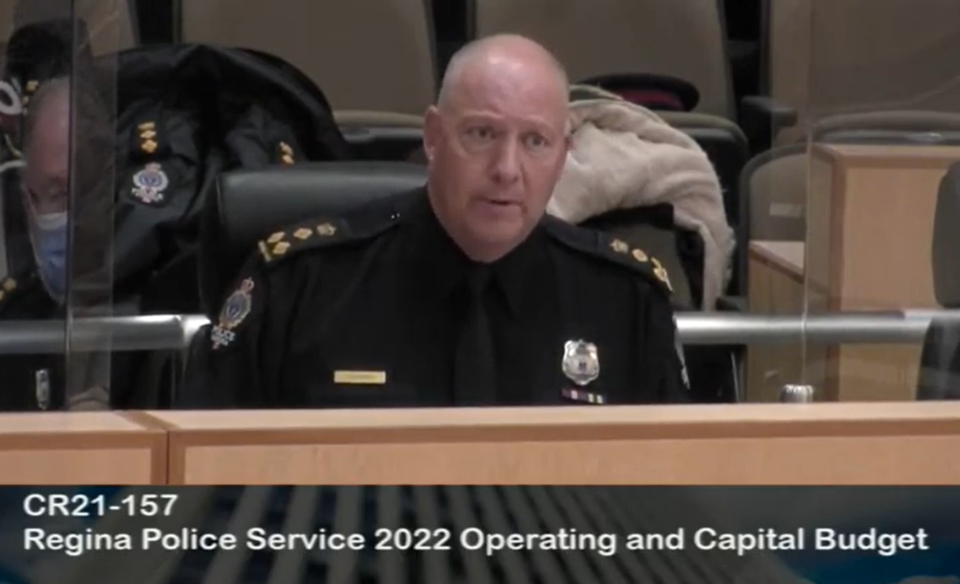REGINA — Regina City Council began budget discussions for 2022 on Wednesday, beginning by parsing through the proposed operating budget request from the Regina Police Service.
The RPS submitted a report to council detailing it’s upcoming operating budget, which includes an estimated net operating budget of $92.8 million for approval, an increase of $3.5 million from last year.
Also submitted to council was a request for approval on a $4.67 million capital budget allocation from the city, to be combined with an additional $548,000 from SGI.
The RPS is looking to expand by hiring an additional 16 officers, seven civilian members and a new deputy chief. RPS Chief Evan Bray said that the service hasn’t hired that many new personnel at once in decades.
Part of the RPS’s budget also includes plans to create a new aerial support unit within the service’s patrol sector, funding allocations for drug screening devices and improvements to tactical training.
The aerial program will involve the purchasing and operation of a plane, to support ground patrol officers during calls to duty. Currently, the RPS has six members who have a pilot’s license and would be deployed to an aerial unit if created.
The topic raised some concerns, from both councillors and members of the public, about the financial cost and implications about police surveillance if an aircraft is added to patrol service.
Bray said that the plane would not be used to monitor residents, but as a support tool for patrol officers to make investigations more efficient.
“If we can resolve calls quicker, more efficiently, it frees those officers up from continuing to work on that call to allow them time to either get to other calls quicker or have undirected, proactive time in their neighbourhoods,” said Bray.
The RPS proposal includes considerations made after consultation with the Saskatoon Police Service, who already operate an aerial program.
Bray said that adding an aircraft to patrol resources will increase the safety of the community and potentially improve crime reduction in Regina.
As an example, Bray explained that in instances where a suspect is fleeing from officers on the ground, aerial support could more safely follow that suspect than vehicle units.
With a plane maintaining pursuit of a suspect, patrol officers would not then be required to engage in pursuits — like car chases or the implementation of methods like spike strips — that could potentially endanger the public, involved officers and suspects.
Bray also said that by utilizing a plane to maintain visual on fleeing suspects, police would be more likely to conclude calls of that nature with an arrest or other result, which could prevent future crime.
Saskatoon Police also reported that deployment of their aircraft aided in locating 23 missing persons last year, said Bray.
The RPS received a total of 1,800 missing person reports in Regina this year, many of which have been resolved but that an aircraft could potentially have helped resolve quicker, he continued.
Councillor Andrew Stevens questioned whether the inclusion of an aircraft would reduce crime enough to justify the expense of an ongoing program, or if the money could be more effectively used in other frontline programs.
The aircraft is expected to cost an estimated $1.6 million, with the provincial government providing $1.3 million and the city of Regina $275,000.
Councillors also questioned whether adding an aircraft to the RPS would align with the city’s declared goal to be 100 per cent renewable by 2050.
Bray said that although a plane would be operating on fossil fuel, it could aid that goal by reducing the emissions from RPS vehicles.
RPS executive director Elizabeth Nguyen also noted that the service has undefined plans to look into purchasing hybrid vehicles to use as patrol cars in the future, but is waiting to see future models from Ford before making an investment.
Several delegates who spoke at the meeting shared concerns over the requested increase for the RPS, as they feel that funding would be better applied to programs and services that address the root causes of crime.
Bray said that the request, despite the current scrutiny of police and their effectiveness, is needed because the community is growing and the service needs to stay “in lockstep” with the city’s needs.
He said service members are responding to more complex calls, and the RPS wants to continue making that possible.
Bray also said that the provincial government carries some responsibility for social social programming, while funding a municipal police force to keep the city safe is strictly on the shoulders of city council.
Ward 6 councillor Daniel LeBlanc echoed the concerns of the delegates, saying that if the “cop-to-pop[ulation]” ratio is unequal, it is due to the way the board has managed its budget allocation, not a funding deficiency.
After more than eight hours of discussion, council voted 7-4 to approve the proposed budget for the Regina Police Service. Councillors Cheryl Stadnuchuk, Andrew Stevens, LeBlanc and Shanon Zachidniak were opposed.





